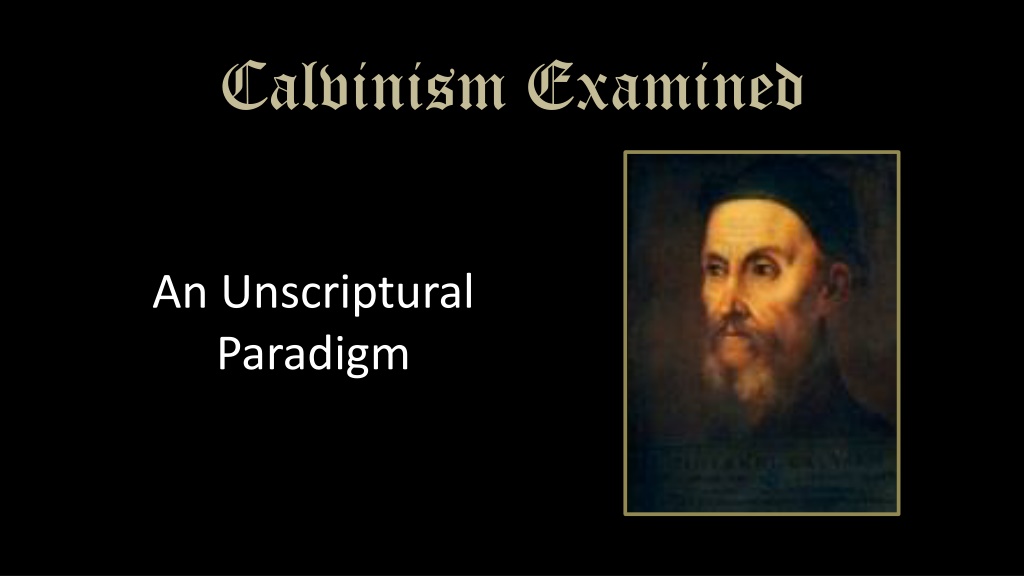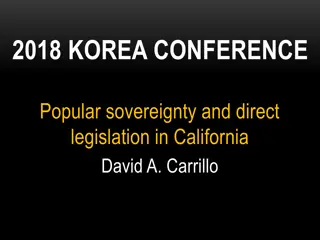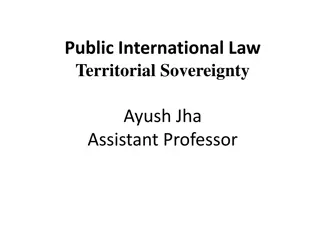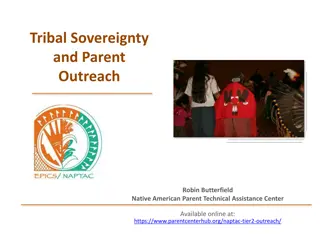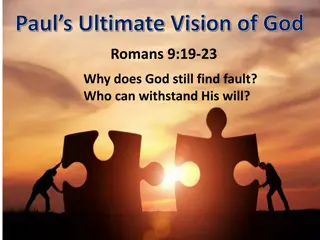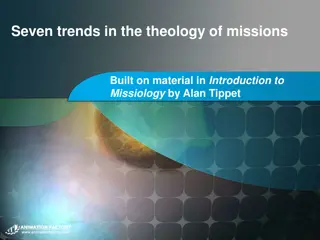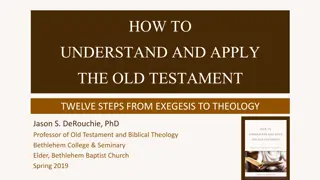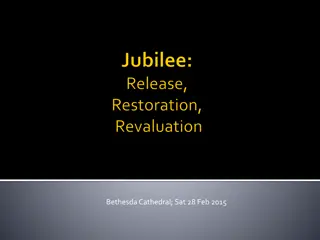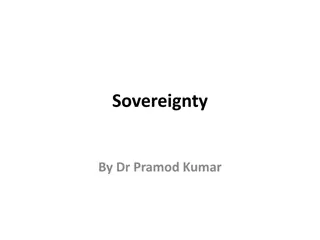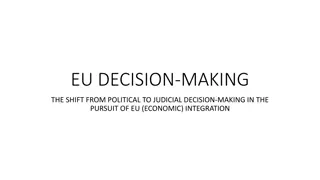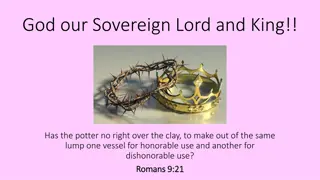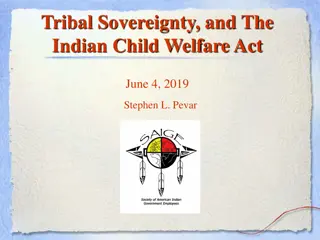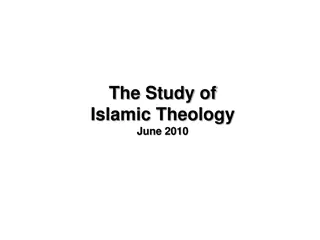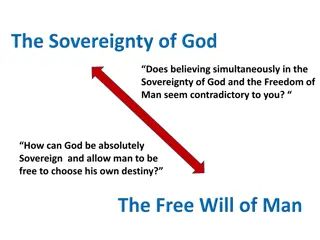Understanding Calvinism and God's Sovereignty in Reformed Theology
Explore Calvinism through an examination of its unscriptural paradigm, the TULIP acrostic representing five cardinal tenets of Reformed Theology, and John Calvin's views on the sovereignty of God. Delve into the concept of Total Depravity and what the Bible teaches about God's preeminence and self-sufficiency in the exercise of His sovereignty.
Download Presentation

Please find below an Image/Link to download the presentation.
The content on the website is provided AS IS for your information and personal use only. It may not be sold, licensed, or shared on other websites without obtaining consent from the author. Download presentation by click this link. If you encounter any issues during the download, it is possible that the publisher has removed the file from their server.
E N D
Presentation Transcript
Calvinism Examined An Unscriptural Paradigm
TULIP An acrostic that represents five of the cardinal tenets of Reformed Theology. Note two things: 1. These are all based on a flawed view of God s sovereignty. 2. The five stand or fall together. If one is invalid, all are invalid.
Calvin on Sovereignty of God (1): God is deemed omnipotent, not because he can act though he may cease or be idle, or because by a general instinct he continues the order of nature previously appointed; but because, governing heaven and earth by his providence, he so overrules all things that nothing happens without his counsel. Institutes of the Christian Religion
Calvin on Sovereignty of God (2): But as unbelievers transfer the government of the world from God to the stars, imagining that happiness or misery depends on their decrees or presages, and not on the Divine will, the consequence is, that their fear, which ought to have reference to him only, is diverted to stars and comets. Let him, therefore, who would beware of such unbelief, always bear in mind, that there is no random power, or agency, or motion in the creatures, who are so governed by the secret counsel of God, that nothing happens but what he has knowingly and willingly decreed. Institutes of the Christian Religion
What the Bible Teaches about Gods Sovereignty God is preeminent and self-sufficient His decrees can not be successfully challenged Sovereignty is not the same as the exercise of full control. God has granted the liberty of choice to mankind. (Matthew 23:37; Mark 16:15-16)
Total Depravity In summary, total depravity means that apart from any enabling grace from God, our hardness and rebellion against God is total, everything we do in this rebellion is sin, our inability to submit to God or reform ourselves is total, and we are therefore totally deserving of eternal punishment. John Piper desiringgod.org
T U otal Depravity nconditional Election
Unconditional Election (3.5) Those of mankind that are predestinated unto life, God, before the foundation of the world was laid, according to His eternal and immutable purpose, and the secret counsel and good pleasure of His will, hath chosen in Christ unto everlasting glory, out of His mere free grace and love, without any foresight of faith or good works, or perseverance in either of them, or any other thing in the creature, as conditions, or causes moving Him thereunto; and all to the praise of His glorious grace. Westminster Confession of Faith
T U L otal Depravity nconditional Election imited Atonement
Limited Atonement It s not a good label. But the limitation is in the conscious design or intention of the atonement by God. Calvinists believe that God really means to accomplish, through the atonement, the conversion of a definite (limited) group of people, not just hold out the opportunity to all people to believe. John Piper desiringgod.org
T U L I otal Depravity nconditional Election imited Atonement rresistible Grace
Irresistible Grace That God's grace is irresistible emphasizes the idea that not only does grace bring His people to glory, but it prepares them for this glory and works within them the desire to enter into glory. Grace is irresistible in the sense that by it the knee is bent which otherwise would not bend; the heart is softened that otherwise is hard as stone. Nor is there anything which can prevent the accomplishment of that purpose of God to save His people by His grace. Herman Hanko The Five Points of Calvinism
T U L I P otal Depravity nconditional Election imited Atonement rresistible Grace erseverance of the Saints
Perseverance of the Saints 17.1 They, whom God hath accepted in His Beloved, effectually called and sanctified by His Spirit, can neither totally nor finally fall away from the state of grace; but shall certainly persevere therein to the end, and be eternally saved. 17.2 This perseverance of the saints depends not upon their own free will, but upon the immutability of the decree of election, flowing from the free and unchangeable love of God the Father; upon the efficacy of the merit and intercession of Jesus Christ; the abiding of the Spirit, and of the seed of God within them; and the nature of the covenant of grace: from all which ariseth also the certainty and infallibility thereof. 17.3 Nevertheless, they may, through the temptations of Satan and of the world, the prevalence of corruption remaining in them, and the neglect of the means of their preservation, fall into grievous sins; and, for a time, continue therein: whereby they incur God's displeasure, and grieve His Holy Spirit, come to be deprived of some measure of their graces and comforts; have their hearts hardened, and their consciences wounded; hurt and scandalize others, and bring temporal judgments upon themselves. Westminster Confession of Faith (desiringgod.org)
Conclusion Calvinists take Bible terms, and give them non- Biblical definitions, thus corrupting the truth of God. There are subtle influences that can be dangerous to the welfare of Christians, and God s people need to be able to identify and refute this prolific doctrine.
